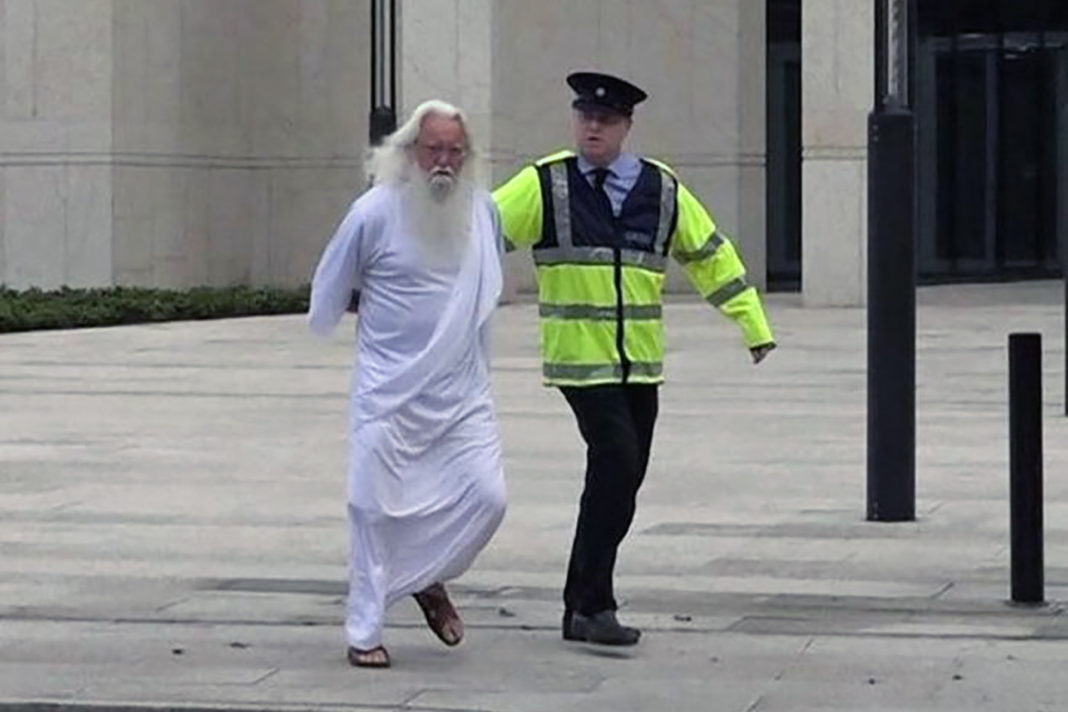The Blessed Virgin was about 14-years-old, gods have been impregnating humans since time began, and Waterford Whispers News was right: Ireland is a country where, not too long ago, a man confessed to rape and initially avoided jail.
In Greek mythology, Hercules was born of a mortal woman impregnated by Zeus, king of the gods. Zeus was also said to have fathered Ion, Asclepius, Minos, Perseus, Helen of Troy, and Alexander the Great.
Theseus was the son of Neptune, and Romulus and Remus the sons of Mars (although Plutarch suggested that Theseus, and Romulus and Remus, were actually born out of wedlock, with godly intervention invented to cover their uncertain parentage.)
In mythology across the globe – including Aztec, Assyrian, Babylonian, Turkish, Egyptian, Chinese, and Japanese religions – the notion of miraculous birth persists. In Native American mythology, the Great Peacemaker, known to the Iroquois people as Dekanawida, was born of a virgin, mortal mother. The Hindu deity Vishnu impregnated Devaki and was born as her son, Krishnu.
In Roman times, which coincided with the era of Christ, the Caesars were rumoured to have been virgin-born. Christian tradition says the Virgin Mary was conceived without sin, and the earliest surviving texts suggest her parents didn’t have sexual intercourse.
In the Gospels of Matthew (1:18-25) and Luke (1:26-38), Mary is described as a virgin who miraculously conceived her son by the Holy Spirit. Christians believe this was prophesied in the book of Isaiah (7.14): “Therefore the Lord himself shall give you a sign; Behold, a virgin shall conceive, and bear a son.”
Matthew’s Gospel says: “When … Mary had been betrothed to Joseph, before they came together she was found to be with child from the Holy Spirit.” According to ancient Jewish traditions, Mary would have been betrothed to Joseph by the age of 14.
Virgin births feature not just across religion, but also in popular culture. Marvel Comics’ execrable 1980 Avengers storyline saw Ms Marvel (nowadays Brie Larson’s Captain Marvel) impregnated without consent by the disembodied villain Immortus, so he could become incarnate in the material world and have a sexual relationship with her.
In the 1988 Star Trek: The Next Generation episode “The Child”, Deanna Troi was impregnated without consent by an alien entity. Critics and fans were outraged at what they saw as the failure of the scriptwriters to address the rape of a central character. In 1994, DC Comics’ Power Girl was involuntarily impregnated by a mystical presence. In Star Wars: The Phantom Menace (1999) Anakin Skywalker, the future Darth Vader, was born of the virgin Shmi.
Of course, popular culture only echoes and reflects recurring human themes. Without putting too fine a point on it, you’d hardly need to be a militant feminist to suspect there’s been something weird going on with humanity and gods and an obsession with virginity and patrilineal succession since pretty much the dawn of time.
Between Covid, an American insurgency, and the Mother and Baby Homes report, it feels a million years ago now, but last month RTÉ removed from its Player a New Year’s Eve Waterford Whispers News sketch, featuring a fake news bulletin presented by former RTÉ newsreader Aengus Mac Grianna.
“In another shocking revelation this year,” Mac Grianna intoned, as an elderly bearded man in white robes was wrestled away by a garda, “God became the latest figure to be implicated in ongoing sexual harassment scandals.
“The five-billion-year-old stood accused of forcing himself on a young middle-eastern migrant and allegedly impregnating her against her will. He was sentenced to two years in prison with the last 24 months suspended.”
While the punchline of the sketch – that Ireland has an often-appalling history of lenient sentencing for rape and sexual crimes – was pretty obvious, and the section clearly well-intended, rape jokes are inherently unfunny and – in the context – unhelpful. (“It was 2,000 years ago!” shouts “God” as he is led away.)
There was a genuine point there about Jesus being born of a child unable to give consent to an infinitely older and omnipotent being, but it’s one unlikely to be appreciated by the likes of Catholic Archbishop Eamon Martin, who tweeted that he was “shocked” that the programme’s producer or editor “didn’t realise how deeply offensive was a mocking ‘news report’ accusing God of rape & reporting his imprisonment”.
(I have been unable to find reports of Archbishop Martin being similarly “shocked” at Pope Francis in 2017 blessing the coffin of Cardinal Bernard Law, a man described in his local paper as “one of the greatest enablers of sexual abuse in the history of the world”.)
If Mary, the mother of Jesus, was about 14-years-of-age when she became pregnant, then she could not have given consent and was absolutely the victim of rape. Modern standards perhaps didn’t apply 2,000 years ago to Mary’s husband, but then if you’re a Christian, Joseph wasn’t Jesus’ father, and if Jesus’ father is indeed an eternal and just God, surely today’s definitions of rape does apply.
It was instructive, if completely predictable, that most of the voices howling loudest online against the Waterford Whispers News sketch were – barely a week later – defending Donald Trump’s right to free speech when social media companies belatedly closed his accounts for using their platforms to incite the assault on the US Capitol which cost five lives.
Those who previously declared that service providers shouldn’t have to provide a service which went against their conscience – specifically, that bakeries shouldn’t have to bake cakes supporting marriage equality – clearly feel the same rules shouldn’t apply to their own tangerine god.
There was a post-script to the Waterford Whispers News skit, one which seems to have been largely ignored in the nonsensical outcry over its alleged blasphemy, and it featured a pretend claim that convicted rapist Harvey Weinstein was demanding a retrial in Ireland. If it was legally possible, why wouldn’t he? After all, to give just one example, Ireland is the country where a man, not long ago, actually confessed to rape and initially avoided a custodial sentence.
In July 2015, 25-year-old Norwegian Magnus Meyer Hustveit was convicted of raping his former girlfriend Niamh Ní Dhomhnaill while she slept, on up to ten occasions between 2011 and 2012. Noting that the case arose because Hustveit had confessed his crimes to Ms Ní Dhomhnaill, Mr Justice Patrick McCarthy then imposed a suspended seven-year sentence.
The following year the Court of Appeal found that the initial sentence had been “unduly lenient”, and Hustveit was given a 15-month jail term.
Between 2012 and 2016, Mayo News columnist Anne-Marie Flynn kept a record of lenient sentences imposed on perpetrators of violent crimes against women. It was not intended in any way to be a definitive record of such sentencing, but nonetheless it makes for sobering reading to see the pattern of leniency, broken down judge by judge, and I would urge you to read it here.
In Ireland, only one out of every four victims of sexual violence reports the crime. Given the high burden of proof, the DPP will only prosecute one out of ten of those cases. Of those prosecutions, less than 5% will result in a conviction. If those convictions lead to lenient sentences, as so many do, then this can only act as a further disincentive for survivors of sexual assault to seek justice.
Ireland has a real problem with lenient sentencing for rape and sexual crimes. It’s funny that more people aren’t offended by that.
Dublin Rape Crisis Centre 24-Hour National Helpline: 1800 77 8888
Sexual Violence Centre Cork: Freephone 1800 496 496








